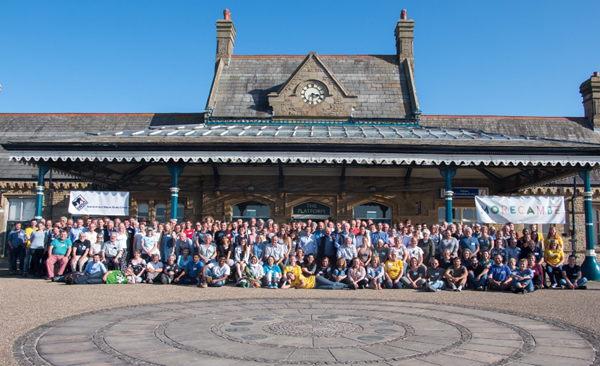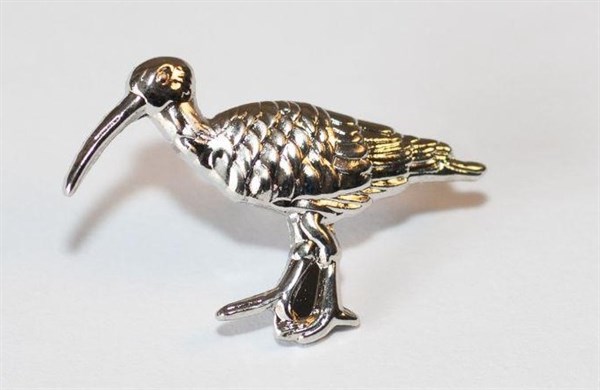
By Jodie Case, Waders for Real Research Assistant
 The end of September saw the Waders for Real team head to Morecambe Bay in Lancashire to attend the International Wader Study Group Conference; a four-day event involving wader scientists from all around the world.
The end of September saw the Waders for Real team head to Morecambe Bay in Lancashire to attend the International Wader Study Group Conference; a four-day event involving wader scientists from all around the world.
LIFE Waders for Real is committed to sharing knowledge and expertise and to this end, two members of our team Ryan Burrell and Lizzie Grayshon helped organise the conference along with other British waderologists. After a full first day of excursions to various wetland habitats, and all delegates having successfully itched their ‘twitcher’ scratch, it was time for the conference to get into full swing!
The conference included two days of talks over the weekend on various areas of shorebird ecology, from ‘Understanding changes in the timing of migration of wading birds at flyway scale’, to ‘How to deal with love triangles in the Pheasant-tailed Jacana’; then onto areas ‘Evaluating the success of agri-environment prescriptions on wader nesting success’ and understanding ‘Impacts of human infrastructure on breeding waders’.
The schedule was jam-packed and there were also talks from different volunteer ringing groups, detailing their work and sharing projects, and an array of posters from PhD students, conservation organisations and many more.
Of specific interest to the LIFE Waders for Real team was the workshop organised by RSPB, University of East Anglia and BTO entitled ‘Predator management for the conservation of breeding waders – Prioritisation of knowledge gaps’.
The aim of the workshop was to understand the knowledge gaps in predation management, with the goal of publishing a review paper to prioritise outcomes. It was excellent to see a range of stakeholders in the audience, from conservation scientists and reserve wardens to land managers and gamekeepers.
The attendees were presented with talks to outline current thinking on predation as a conservation issue for breeding waders and predator management strategies. Dr Andrew Hoodless, Head of Wetland Research at GWCT spoke first about ‘Reducing predation through lethal control’. The talk provided understanding of the current situation regarding predation pressure on wading birds and its impact on wader populations through reduced nest and chick survival.
Next Dr Jen Smart, a lead conservation scientist at the RSPB spoke about non-lethal predator control and what is known about reducing predation pressure on breeding waders through manipulation of habitat, prey and behaviour in wet grassland. Jen has visited the LIFE Waders for Real project on a number of occasions and provided excellent insight, when our experts have had knowledge sharing meetings with staff from other organisations working in similar settings to the Avon Valley.
Jen was followed by a presentation from Prof Jenny Gill of the University of East Anglia, sharing research into predator exclusion in the field, specifically looking at fencing. This talk detailed the potential for exclusion fences to be deployed in breeding wader areas to increase wader hatching and fledging success. Within the LIFE Waders for Real project we have been trialling this strategy and are looking forward to releasing our findings this winter
The penultimate talk was given by Rebecca Lee from the Wildfowl and Wetlands Trust who spoke about ‘Headstarting as a conservation tool for waders’, a method of collecting eggs from the wild under licence and raising them in captivity. Though it is not the overall solution, this approach buys us more time to save populations at the critical point and is being used on Curlew and Black-tailed Godwit in the UK alongside Spoon-billed Sandpipers in Asia.
She explained this conservation tool should be undertaken as part of a wider conservation programme that addresses the underlying causes of decline. Thankfully, we are not quite there yet with either lapwing or redshank and we have our fingers crossed that through the hard-work of stakeholder groups and conservation organisations, as with LIFE Waders for Real we will be able to reverse declines before we need to consider head-starting.
After Rebecca, Mike Short, Senior Field Ecologist on LIFE Waders for Real presented our research using GPS tracking to understand fox ecology in wet meadow habitats and how foxes, being a key predator of ground nesting birds, behave around breeding waders. This research gives fascinating insights into mammalian activities which is being used by us to better understand their management requirements. More to come on this soon, we promise.
After all presentations, each speaker highlighted any knowledge gaps they considered pertinent in relation to their topics and predator management in general, which stimulated wider discussion within the audience, who were all involved in the conservation of breeding waders and/or carry out predator management.
The workshop concluded with a varied and insightful discussion by the whole audience on prioritisation of the suggested knowledge gaps to help guide future research and conservation strategies. We think the organisations involved did a great job with this workshop and it was brilliant to see an audience covering all aspects of wildlife management and wader conservation. We are excited to see the report from the workshop when it is published.
The conference was incredibly interesting and useful, utilising the unique opportunity of so many experienced and knowledgeable minds to talk about wader conservation, as well as predator control as an important conservation tool in the protection of breeding waders.

Thank you to the International Wader Study Group for organising such a successful and exciting event!
Want to learn more about Waders for Real?
Visit the Waders For Real website and get all the latest project updates on Twitter and Facebook.

Get your Curlew Supporters Badge for £9.99
You can help us get practical curlew conservation advice to those on the ground by buying one of our curlew pin badges. £5 from the sale of each badge goes to our Action For Curlew project, which is helping to provide advice to farmers, landowners and gamekeepers on the action they can take to reverse the alarming decline in curlew numbers. Badge measures approx 3cm.
View Badge >
or
Buy Now - £9.99 >
100% Secure. All Credit & Debit cards, PayPal, Apple Pay and Google Pay accepted.
